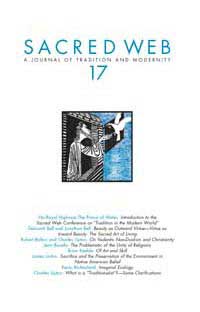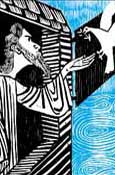Sacred Web 17
Editorial: What is Normal?
by M. Ali Lakhani
In a world of changing norms, it is important to ask ourselves what it means to be “normal”. The traditional answer is to locate normalcy in the metaphysical structures of reality—in the primordial nature we carry within ourselves. The loss of this metaphysical Center results in the disintegration that characterizes modernism. The Editorial examines the pathology of the abnormal and reminds the reader of the traditional view in which sanity is that which connects “holiness” to the integrity of being “whole”. Read more ...
Introduction to the Sacred Web Conference
by His Royal Highness The Prince of Wales
Sacred Web will host its inaugural Conference at the University of Alberta in September 2006. In this speech, specially written for delegates who will attend the Conference, His Royal Highness The Prince of Wales introduces the Conference theme of “Tradition in the Modern World”. Read more ...
Of Art and Skill
by Brian Keeble
There is so much nowadays that passes for art, that it begs the question “what is art?” Arguing against the avant-garde vacuity of innovation, this essay reminds us that art is the application of skill within its chosen medium for the purpose of making reality intelligible, imposing order and beauty upon substance in imitation of the divine act of creation. Read more ...
Beauty as Outward Virtue—Virtue as Inward Beauty: The Sacred Art of Living
by Deborah Bell and Jonathan Bell
This article, which was given as a paper for the “Seminar on Art, Tradition and the Traditionalists” organized by the Iranian Academy of Arts, in association with the Iranian Philosophy Institute, on November 20, 2004, presents the ideas of Frithjof Schuon and the Traditionalist School on the reciprocity between beauty and virtue from the highest reaches of metaphysics to their expression in the world of nature, sacred art and human activity. Read more ...
What is a "Traditionalist"? – Some Clarifications
by Charles Upton
This response to Dr. Legenhausen’s article, “Why I am not a Traditionalist”, deals with the different understandings of what one means by the term “Traditionalist”, distinguishing it from usages that deviate from the way in which the term is used in this journal, and then with Upton’s refutation of certain criticisms leveled by Legenhausen against Tradition, many of which are commonly held misconceptions. Read more ...
On Vedantic Non-Dualism and Christianity:
A Dialogue between Robert Bolton and Charles Upton
The authors of this private exchange of correspondence have permitted Sacred Web to publish this edited version of their exchange which deals with various metaphysical issues, focusing on their respective interpretations of divinity, primarily from the perspectives of Advaitic Vedantism and Christian Platonism. Read more ...
Sacrifice and the Preservation of the Environment in Native American Belief
by James Larking
At the heart of the environmental debate lies the issue of sustainability. Native traditions, in their spiritualized view of creation, have articulated the primordial view that sustainability and harmony are linked to the notion of sacrifice. This article outlines these themes, drawing upon illustrations from the worldview of native Americans. Read more ...
Imaginal Ecology
by Kevin Richtscheid
The West is rediscovering the importance of the imaginal realm of angelic archetypes, particularly through the important scholarship of Henry Corbin, whose works have mined the sources of this realm in the writings of Ibn Sina, Suhrawardi, Ibn Arabi and Mulla Sadra, among others. This essay discusses the relevance of the imaginal dimension in addressing the concerns of ecology, and, more importantly, its role in reconnecting modernity to its seminal roots. Read more ...
The Problematic of the Unity of Religions
by Jean Borella
Borella uses the context of an anthology on Christian metaphysics, edited by Bruno Bérard, to critique the traditionalist reconciliation of Truth and religious diversity. Writing from a partisan Christian perspective, he challenges both the Guénonian theory of the King of the World and Schuon’s thesis of the Religio perennis, arguing instead for a Religio essentialis based on “an analogical unity” of religions, “the first analogue of which is the religion of Christ”. This controversial essay revisits Schuon’s avataric views on the Incarnation, which, for Borella, constitute an improper attempt to relativize the trinitarian relationship that lies at the core of the divine Essence. Read more ...
Notes on Contributors




